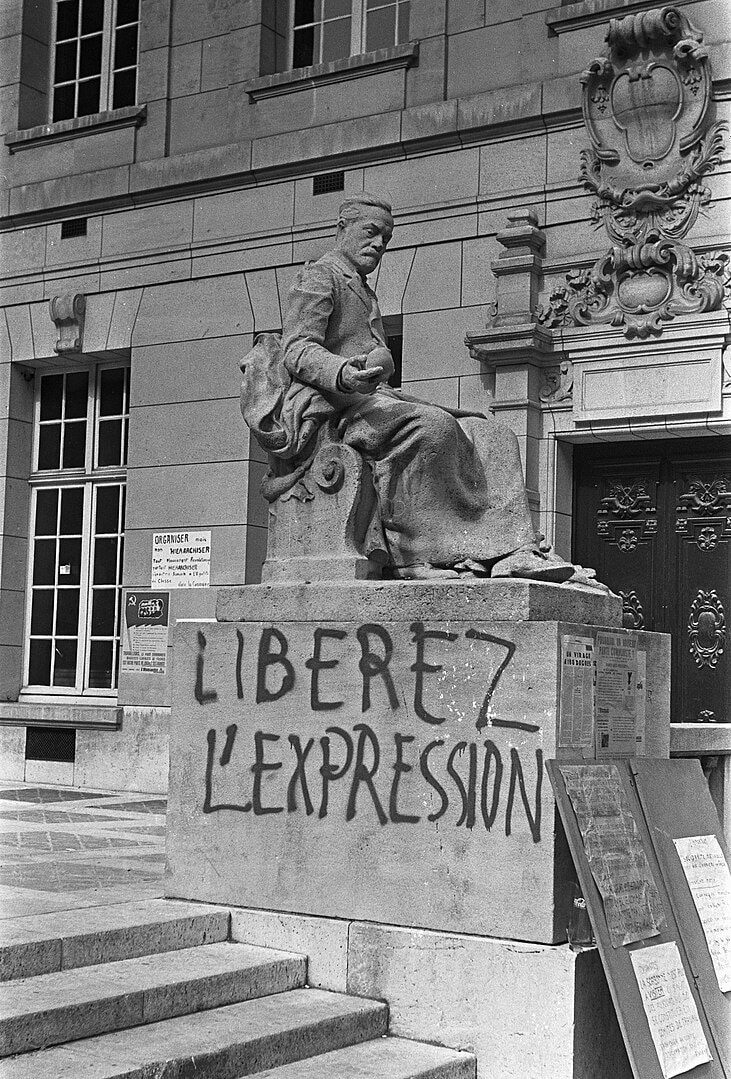From the article:
Bourgeois history has primarily retained from ’68 the spectacle of the student-led revolts in the heart of Paris: the barricades in the Latin Quarter, the occupation of the Sorbonne, the libertarian sloganeering, and so forth. A significant segment of the intelligentsia, particularly anarchist, Maoist, Trotskyist, libertarian socialist, and Marxian currents, wrote in support of these revolts and often joined them in the streets and the various occupations. Marxist-Leninist intellectuals generally questioned the strategic clarity of the unorganized petty-bourgeois and anticommunist politics of many of the more vocal students, which they criticized for being gauchistes and beholden to the illusory belief in a revolutionary situation.5 At the same time, many of these intellectuals also recognized the youth uprising as an important catalyst for a new phase of class struggle, and they stalwartly supported the mobilization of workers.
These different segments of the intelligentsia, as we shall see, were not those that rose to global prominence as major contributors to the phenomenon known as French theory.6 On the contrary, those marketed as the ’68 thinkers—Michel Foucault, Jacques Derrida, Jacques Lacan, Pierre Bourdieu, and others—were disconnected from and often dismissive of the historic workers’ mobilization. They were also hostile to, or at least highly skeptical of, the student movement. In both senses, they were anti-’68 thinkers, or at a minimum, theorists who were highly suspicious of the demonstrations. Their promotion by the global theory industry, which has marketed them as the radical theorists of ’68, has largely obliterated this historical fact.


"but don't accuse me of being reactionary"
I never did but I know that talking-points like this one are common and it just gives people an excuse to not organize or do any bit of activism.
It would not matter if the purchasing power is better as it means little to quality of life for an American. Go to where I live. Poverty. Go to prison. Poverty. Go to the homeless in the city. Poverty.
Republican talking-points are that the poor are not poor and that they own an iPhone or a computer and therefore have it easy.
I am not saying that we shouldn't be organizing, I'm just saying we shouldn't expect our activism alone to turn the situation around.
Again, there is poverty, but it is too spread out and completly disorganized. There is no peasant or proletariat community that are the traditional building block for communist or anarchist movements. The closest thing we can get is ethnic minority communities, and that could be enough to create an effective political bloc. But that will not be the case forever.
They don't make life 'easy', but they do make life 'tolerable'. I can't even remember how many times I have had discussions with people about activism or politics and just receive blank stares, but as soon as I bring up video games or tv shows their faces light up and are engaged. These are people who are right next to the poverty line despite working 40+ hours. If they get to a point where they can no longer afford those things, then maybe they will engage in politics. Maybe not. The point is to have the organizations and capacity to facilitate their understanding and redirect them away from reactionary tendencies.
These aren't the days where the whole town comes out to support the strike, only to be put down by the national guard.
There is a proletariat. They deal with the largest incarceration rate in the world. What ethnic minority communities? You mean people like me? But what about the bourgeoisie within them as well? And why are you banking on us to save white people or whatever? Sorry, but I take a bit of offense to that. 😅
"They have video games." Yup. Spotted it.
Frankly, my message was snippy and that was rude of me. I don't mean to insult. My apologies. @TreadOnMe@hexbear.net
It's ok. These can be frustrating subjects, with no clear answers. Solidarity!
sure sure